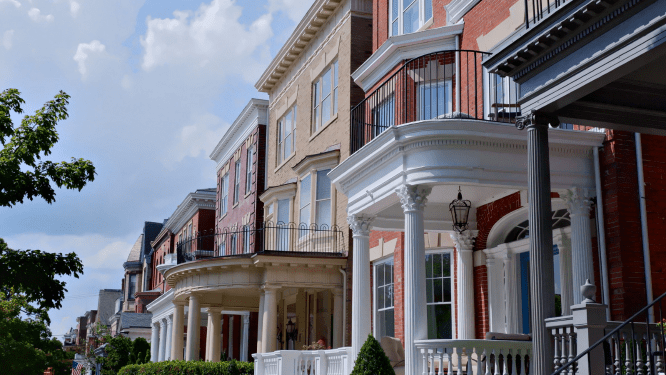What’s the Average Virginia Real Estate Commission Rate?
- Published on
- 14-15 min read
-
 Stacy Sare Cohen, Contributing AuthorClose
Stacy Sare Cohen, Contributing AuthorClose Stacy Sare Cohen Contributing Author
Stacy Sare Cohen Contributing AuthorStacy Sare Cohen is a seasoned content writer with a passion for real estate, home design, decor, and home improvement. She holds a B.A. in English from UCLA and has been published in Apartment Therapy, Angi, HomeAdvisor, and elsewhere. When Stacy’s not creating content, she’s dreaming up new project ideas for her newly remodeled condo.
-
 Richard Haddad, Executive EditorClose
Richard Haddad, Executive EditorClose Richard Haddad Executive Editor
Richard Haddad Executive EditorRichard Haddad is the executive editor of HomeLight.com. He works with an experienced content team that oversees the company’s blog featuring in-depth articles about the home buying and selling process, homeownership news, home care and design tips, and related real estate trends. Previously, he served as an editor and content producer for World Company, Gannett, and Western News & Info, where he also served as news director and director of internet operations.
Editor’s note: On March 15, 2024, the National Association of Realtors (NAR) announced a landmark lawsuit settlement that will change the way real estate agent commissions are handled in the future. These changes will “decouple” seller and buyer agent compensation. Industry experts predict that this decoupling will likely lower agent fees and give buyers the ability to negotiate commission amounts directly. Learn more.
Most real estate agents in Virginia get paid through commissions. Commissions are typically calculated as a percentage of a property’s sale price, though some brokerages will charge a flat fee. The average real estate agent commission rate nationwide is 5.8% of the home sale price, according to HomeLight’s real estate transaction data of thousands of home sales each year. But how does that compare to the average real estate commission rate in Virginia?
In this post, we’ll help you determine how much commission you might pay on your Virginia home sale, and what options are available to earn the highest proceeds possible.
What’s the average real estate commission in Virginia?
According to top Virginia agent Walter Grewe of Roanoke, you can expect to pay between 4%-6% in agent commissions when selling a home in Virginia, with some variation based on location within the state. On a property worth the current statewide median home sale price of $391,000, that amounts to $15,640–$23,460 in commission costs.
However, Grewe, who has 17 years of experience, says he has seen sellers pay a set monetary amount instead of a percentage.
Using an overall statewide average of 5%, here’s a breakdown of how much you might pay in real estate commissions based on what a home sells for in six of the largest cities in Virginia:
| Virginia city | Median home price | Average commission at 5% |
| Virginia Beach | $320,000 | $16,000 |
| Chesapeake | $325,000 | $16,250 |
| Arlington | $622,500 | $31,125 |
| Norfolk | $267,500 | $13,375 |
| Richmond | $310,000 | $15,500 |
| Newport News | $225,000 | $11,250 |
Median home price source: VirginiaRealtors.org
HomeLight gathers agent commission data from cities throughout the U.S. To see if we have commission rates for your city, try our Agent Commissions Calculator. You might also be interested in our Home Value Estimator.
Still curious about commission rates in Virginia? Here are the answers to common questions about real estate agent commissions:
Who pays real estate commission fees?
The commission is typically paid by the home seller, and the seller’s agent will then split the commission with the buyer’s agent. As Grewe explains, “It’s been my experience that commission is typically split 50/50 between the buyer’s agent and the listing agent, but [percentages and flat rates are] negotiable,” Grewe says.
When is the commission paid?
The real estate commission will automatically be deducted from the sale proceeds at the time of closing. Until then, you won’t owe any money to the real estate agent. If you’re curious about how much you might make on your home sale after paying commissions and other selling costs, try our Net Proceeds Calculator.
Does the agent get to keep the full commission?
Although the seller pays the entire commission, the listing agent, who is representing the seller in a transaction, doesn’t keep it all. Part of their commission will go toward marketing your property with professional photography, open houses, offline marketing, and more.
Grewe says that for every client’s home, the team he leads invests about $500 to $1,000 upfront to market each listing. “We hire a professional photographer for every listing; they also do a floor plan for us on every listing; we do boosted posts on social media outlets [such as] Facebook and Instagram, just to name a few,” Grewe says.
Additional marketing that top agents will invest in can include:
- Advertising on the MLS and other real estate portals
- Producing and distributing flyers
- Preparing open houses by putting out signs and purchasing snacks
Grewe explains that in more affluent Virginia neighborhoods, listing agents invest more in open houses. “I know in places like Northern Virginia — where the price point of homes is significantly higher than they are here –– they’ll put out food trucks and things like that,” Grewe says. “So there can be a significant amount of money involved in just the first week of putting the home on the market.”
In addition, the commission is also typically split 50/50 with the buyer’s agent to compensate them for bringing a buyer to the sale and coordinating the buy-side of the transaction. So, around 2.5% to 3% goes to the listing agent, and the other 2.5%-3% goes to the buyer’s agent.
Both the listing agent and the buyer’s agent will then share a percentage of their commission with their sponsoring broker.
These split rates can vary; however, it’s common for the listing agent to give their broker anywhere from 30%-50% of their commission, depending on the agent’s level of experience, their market size, and brokerage agreement.
How is the commission divided between agents?
The commission that’s paid by the seller will typically be split among each agent and the brokerages through which they hang their real estate license. Let’s say you sell your home for $391,000 with an average 5% commission rate. You pay a commission of $19,550, and each agent has a 70/30 split agreement with their brokerage. Here’s how that might look:
- Listing agent: $6,843 (70% of their $9,775 commission share)
- Listing broker: $2,932 (30% of their $9,775 commission share)
- Buyer’s agent: $6,843 (70% of their $9,775 commission share)
- Buyer’s broker: $2,932 (30% of their $9,775 commission share)
Are Virginia commission rates negotiable?
You can negotiate real estate agent commission rates, but for properties and locations in high demand, don’t be surprised if your agent holds firm on how much they charge. A Consumer Federation of America report found that only 27 percent of agents are willing to negotiate the commission.
One reason some agents may not want to lower their rate is that it can reduce their ability to negotiate a higher sale price for the seller. An agent’s services often include photography and pricing analysis, so a lower commission could also translate into a smaller marketing budget for your property, an inaccurate list price, fewer home promotions, and a lower likelihood of selling.
If you’ve found your own buyer
Exceptions can occur if you’ve already found a buyer. Let’s say you’re selling a home to a friend, or have decided to sell to a family member, in that case, the agent would likely be willing to play the role of transaction coordinator and independent go-between for a reduced commission rate.
The lowest commission a Virginia agent could take
Grewe has seen many agents negotiate commissions below 6%, depending on the situation and the type of brokerage. “I’ve certainly seen different commission structures throughout my career, especially on the foreclosure side of things,” he adds.
“You have other brokerages that have a more nontraditional way that discounts commission; they may only be offering 5%, and the split is 2.5% and 2.5% or a 2% and 2% [commission split],” says Grewe. “I’ve [also] seen [flat fee real estate commissions] instead of a percentage where somebody may only be offering $7,500 or $5,000. Usually, that’s done by internet brokerages [or] limited service brokerages.”
Overall, commissions in Virginia are negotiable but do your research first. When asking an agent to lower their pay, you’re limiting the pool of agents willing to work with you. And the downsides to working with a low-commission agent can be steep. Without a top Virginia agent in your corner, you could dramatically undersell your home, have a rough selling experience, or fail to sell the home at all.
What is included in a real estate agent’s commission?
A full-service real estate agent in Virginia will provide a high level of offerings that go toward giving you a great selling experience and boosting exposure to your home.
An agent’s services fall into a few main categories:
Guidance on pre-sale improvements
Agents see a lot of houses in their Virginia markets. They will have an eye for the small but impactful improvements you could make to help it sell for more. The best agents will go above and beyond to help their clients get the job done.
“Curb appeal is number one,” explains Grewe. To that end, he recommends spending a couple of hundred dollars on mulch, and fresh flowers, and painting your front door, the door stoop, or the porch.
“[Buyers] are sitting in a car or standing in the yard, staring at the front of your house,” says Grewe. “If the front of your house has old mulch and half-dead bushes and no flowers; if the door sill is chipped and peeling or hasn’t been painted for five or six years, and things don’t look as good as they could, there goes your first impression right out the window,” explains Grewe.
Pricing strategy
An agent will put together a comparative market analysis (CMA) in the form of a thick packet featuring charts, facts, figures, and photographs of houses. The analysis will show you what your home is worth based on comparable sales in the neighborhood, market trends, and local price per square foot. This key tool helps you set a realistic price that can attract offers right off the bat in a fraction of the time it would take a non-professional to determine.
“When we meet with [sellers], a lot of times [they] might have a little bit of an inflated opinion on what their home is worth,” Grewe says. “One of the [pricing] strategies we’ve used to help people get a more realistic view of what their house is worth is to set up showings with the other homes that are listed for sale in their area that are a direct comp to their house.”
He’ll point out updated kitchens and flooring when they tour other area homes. “If your house was built in 1965 and you still have a pink bathroom in the [primary] bedroom, and [the other homes] have torn all that out and put in new tiled shower stalls and upgraded their bathrooms and kitchens, this gives them a real understanding of why we’re pricing the home the way we are,” Grew explains.
Marketing services
As part of their commission, at a minimum, Virginia agents should offer expert home prep and staging, professional photography, marketing flyers and pamphlets, direct mail, automatic postings of your listing on major home search sites, local advertisements, exclusive previews for other brokers, and open house coordination. Advanced agents may also offer the development of a virtual tour.
Grewe recalls a client approaching his team for help because she couldn’t sell her house for over six months. After reassessing her home, they told her she could get a higher sale price. They generated buyer interest through marketing strategies such as boosted posts and a Facebook live house tour. The result was swift and successful. “We ended up selling the house within three weeks,” Grewe says.
The satisfied client then referred Grewe to a friend, and they quickly sold her Virginia house in three days using the same marketing approach. “Both clients received full list price on their houses,” says Grewe.
Offer management and negotiations
Whether you receive one or multiple offers, an agent will help you determine the strength of the offer and work with you to proceed with responding to buyers. They’ll advise you on whether to accept, reject, or make a counteroffer while putting together offer spreadsheets to identify the best offer in bidding war situations.
If a buyer requests repairs after the inspection, an agent will help you push back where appropriate and advise on when to concede. Should the appraised value be lower than the contract price, an agent can help you determine whether to ask the buyer to make up the difference or if you should lower your price.
Market knowledge and neighborhood expertise
Great Virginia real estate agents know what local buyers seek in homes and which of your home’s attributes to highlight. An agent will skillfully incorporate key features into your home’s listing description and immediately be able to recognize what makes your house or the surrounding area special.
“I think it is extremely important [for an agent] to do their due diligence before ever sitting down with [a client],” Grewe says. “I will do a CMA on the house before I go out there and looked at it,” says Grewe, who writes about local market conditions on the company’s blog and website. “I like to see where we were last year compared to where we are this year, I mean, list price in our area was up almost ten percent March over March,” Grewe says.
“To be able to sit down with somebody at their kitchen table and say, ‘look, this is something I just looked into yesterday, and across our MLS footprint, the average sale price has gone up $28,000 in 12 months [is good information to know].”

What is a fair real estate commission in Virginia?
As noted above, the average commission rate in most Virginia markets is between 4%-6% to hire a full-service real estate agent. This rate should mean you have an agent who is dedicated to selling your home for the best possible price, who is available and communicative, and who is willing to shepherd the transaction from start to finish. If an agent isn’t willing to offer all or the majority of services listed above, you should focus on interviewing real estate agents who do.
What if my Virginia house doesn’t sell?
Real estate agents only get paid commissions if and when your home sells successfully. Most real estate contracts include an exclusive right to sell, which gives the real estate agent the sole rights to market the property, list the property on the MLS, and receive the commission if the sale closes within a determined time frame. If your house remains on the market beyond the time period outlined in the listing agreement, you are not obligated to pay your agent.
However, keep in mind that your listing agreement may contain a protection clause, also known as a “brokerage protection clause,” “safety clause,” “extension clause,” or “tail provision.” The protection clause states that if a buyer who the listing agent introduced to the property purchases the property after the listing agreement expires, the seller still must pay the agent a commission.
How can you avoid paying Realtor fees?
There are two main ways to avoid paying Realtor® fees. You can either sell your Virginia home without an agent’s help or sell it directly for cash offers without ever putting it on the market.
For Sale By Owner
Without a real estate agent, you’re responsible for preparing your home for sale, marketing, negotiating, and navigating legal and financial documents. When selling a house on your own, you’ll need to hire an attorney, at a minimum, to make sure the paperwork is right.
Typically, For Sale By Owner (FSBO) makes the most sense if you already have a buyer. Sellers are often drawn to for sale by owner benefits, but in 2022, 50% of FSBO sellers knew their buyer.
This indicates that while the FSBO route is rare, making up just 10% of sellers, it’s even rare to forgo a real estate agent’s help when you don’t already have a buyer lined up and ready to go. In addition, according to a 2022 National Association of Realtors report, the median FSBO house sold for $225,000, compared to a median of $345,000 for agent-assisted sales. That’s a significant loss of proceeds in an effort to save 5% on commissions when selling a Virginia house FSBO.
Sell to a cash buyer
Cash buyers — including iBuyers, investors, and Virginia house-buying companies — are individuals or entities that purchase your home outright, without the need for lender financing. These buyers typically consider off-market home sales and can provide speed and convenience to sellers.
Just be aware that the price offered by most cash buyers may not match what you could receive on the open market with the help of a top agent.
If you’re interested in a cash sale, you can receive a no-obligation offer through HomeLight’s Simple Sale platform, with no hidden fees or agent commission. Simple Sale connects you to the largest network of cash buyers in the U.S.
Now you know how Virginia agent commissions work
Sellers pay real estate commissions in exchange for an agent’s expertise and services throughout the sale process. If you’re worried about the cost of the commission, consider that targeted upgrades, stellar marketing, and savvy negotiations can help you maximize your sale price. With a performance-proven Virginia agent to guide you, you also avoid the stress of navigating this complex process without professional oversight.
The key is finding a quality local agent who provides the highest amount of value for their commission fee. In fact, our transaction data shows that the top 5% of agents in Virginia sell homes for as much as 10% more than the average agent.
HomeLight can connect you with top Virginia agents with experience tailored to your needs. Whenever you’re ready to get started, HomeLight would be happy to put your commission worries to rest by introducing you to several agents in your area who are well worth it.
Writer McCoy Worthington contributed to this story.
Header Image Source: (Stephanie Rhee / Unsplash)








